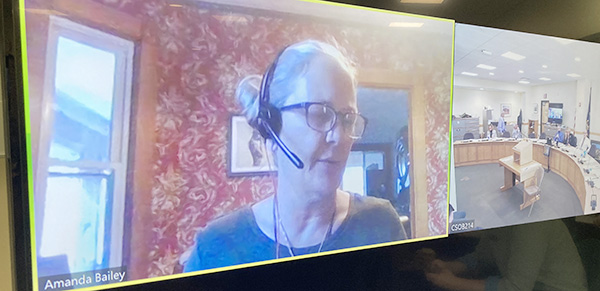Bargaining News
|February 9, 2024
Lack of pay parity keeps the Maine DHHS Office of Family Independence bleeding staff

MSEA-SEIU Member Amanday Bailey testifies in support of LD 2121, An Act to Address Chronic Understaffing of State Government Positions, sponsored by Representative Drew Gattine.
Senator Nangle, Representative Stover, members of the Committee on state and local government. Good afternoon. My name is Amanda Bailey. I am proud to serve the people of Maine as an eligibility specialist for OFI (Office of Family Independence). I am a resident of Lubec. I’m here to speak in support of LD2121.
OFI serves about a third of Mainers. One out of every 9 residents receives food stamps and 410k are on MaineCare. I believe there are about 400 eligibility specialist positions in the state of Maine. We have an incredibly complex position which requires mastery of both technology and policy. Around 25% of these 400 positions are constantly either in the initial nine month training period or open. The reason for this is quite simple. My job is not classified correctly. My first clue to that fact was coming in at step 3 on the pay scale. My next was being bumped up to step 4 a few months later because they couldn’t find enough people to hire at step 3. I’ve been with the state a little over two years now, and I at am step 6. I have three more raises before I am topped out and the third only because my union won it in the last contract. The very fact that the position starts at step 4 speaks to the degree to which it is misclassified. I am interested in learning what kind of mental gymnastics it takes to start us at step 4 and then turn around and tell us our job is classified correctly. When I read that the administration is arguing no pay gap exists I became even more interested. Granted I am not a statistician but I can do basic math. The cost of living in Maine is 18.2% less than that of Massachusetts. My job tops out at $89,600 there, about 40% more than current top out here. That doesn’t sound like parity to me. Rhode Island has a very similar cost of living to Maine. I didn’t see an open position and pay for my job there, which is not surprising since the receptionists at the DHS there top out at $5k a year more than I do. That sure doesn’t sound like parity to me. And the truth is that this lack of parity keeps us bleeding workers in the southern part of the state. Even in our office we’ve had turnover. People finish the Medicaid and Food Stamp training and leave this job because it is too much work for the pay. It just is. And the results are damning for Mainers. We are talking about food and healthcare here. These are necessities. As a historian who studied social class and poverty extensively while earning my masters, I understand the importance of these programs on a level most likely don’t. I believe in what I do. It pains me to see people do without food or medical care because we just can’t get time to update their cases or as is happening more and more often, a mistake is made by some half-trained contract worker leading to loss of benefits, which for some seniors can even mean loss of part of their social security benefits to Medicare Part B premiums. These things are a direct result of the low pay for the job we do.
As for the workload? It’s insane. Quite frankly my coworkers and I are drowning. The contract workers aren’t the answer. I wish you could read the case notes and see the work I see so that it could be made plain they aren’t the answer. One Saturday the first 8 cases I touched were full of simple errors, most involving figuring out the 30th day of application. Overtime isn’t the answer. It’s nice, and I sure need the money, but it’s not sustainable. I’m exhausted already. We all were before it even started because we are wearing ourselves out trying to keep up. The answer is higher pay for this position so we can hire and retain workers. It’s obviously a known issue or we wouldn’t start at step 4. And on a personal note, I need the hope of more money. I can’t top out in three years. It is not enough pay for the work. It is not enough money to ever live anything but paycheck to paycheck. And no one is going to want that forever, which is why most new workers don’t stay in this position. Nearly everyone I trained with appears to be gone. I am a little different. I love my job. I enjoy the complexity of the job. Furthermore I am good at my job. I want to keep doing it, and I want to keep doing it in Maine. I am here today asking you to make that possible.
I ask you to vote in favor of LD2121. Thank you.